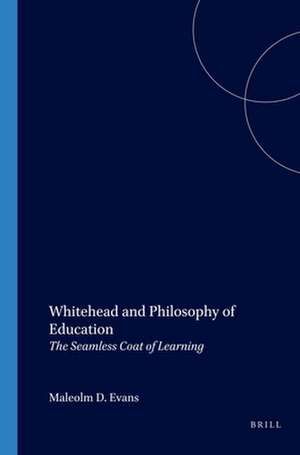Whitehead and Philosophy of Education: The Seamless Coat of Learning: Value Inquiry Book Series / Philosophy of Education, cartea 74
Autor Malcolm D. Evansen Limba Engleză Paperback – 31 dec 1997
Whitehead writes of phases of the rhythm of education - romance, precision, and generalization. The book is organized with attention to these three phases. Part One-Romance introduces readers to Whitehead the person, and the change of context for educating from a mechanistic world-view to an organismic one. Part Two-Precision examines Whitehead's writings, as they relate to process philosophy and to educating. Part Three-Generalization is an application of the explorations of Parts One and Two, yielding a construction of a Whiteheadian philosophy of education and suggestions for educational practice.
Preț: 263.94 lei
Nou
Puncte Express: 396
Preț estimativ în valută:
50.51€ • 52.86$ • 42.04£
50.51€ • 52.86$ • 42.04£
Carte indisponibilă temporar
Doresc să fiu notificat când acest titlu va fi disponibil:
Se trimite...
Preluare comenzi: 021 569.72.76
Specificații
ISBN-13: 9789042004320
ISBN-10: 9042004320
Dimensiuni: 150 x 220 mm
Greutate: 0.26 kg
Editura: Brill
Colecția Brill
Seria Value Inquiry Book Series / Philosophy of Education
ISBN-10: 9042004320
Dimensiuni: 150 x 220 mm
Greutate: 0.26 kg
Editura: Brill
Colecția Brill
Seria Value Inquiry Book Series / Philosophy of Education
Cuprins
Editorial Foreword. Preface. Copyright Acknowledgments. Part One: Romance. ONE Whitehead: A Life of the Mind in the World. TWO Context: Two Worldviews. Part Two: Precision. THREE Philosophy: Whitehead, Philosophy, and Education. FOUR Speculation: Examining Whitehead's Philosophy. Part Three: Generalization. FIVE Construction: A Whiteheadian Philosophy of Education. Notes. Bibliography. Appendix: Whitehead's Writings Relevant to Education. About the Author. Index.
Notă biografică
Malcolm D. Evans is currently executive secretary of the Association for Process Philosophy of Education, an organization focused on bringing the process philosophies of John Dewey, Henri Bergson, and Alfred North Whitehead to the attention of educational theorists and philosophers. He has been a teacher, principal, and superintendent of schools in several communities. Following retirement from public school administration, he was a visiting scholar at the School of Theology at Claremont, California where the Center for Process Studies supports research on the process thought of Alfred North Whitehead. His work in recent years has been in the advocacy of process philosophy as a foundation of educational theory and practice. He received his Ed.D. in educational administration from Harvard University.



